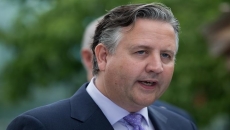A federal wage subsidy for employees in businesses hit hard by COVID-19 will last at least through the summer and the federal government is asking companies to rehire laid off staff — many of whom have received aid from an emergency benefit that has gone over budget.
The $73-billion Canada Emergency Wage Subsidy was set to expire in the first week of June, only a few weeks after the first payments rolled out and with only a small fraction of its budget spent.
Subsidies will now be available through to the end of August, though the legislation that created the subsidy gave the government the authority to extend qualifying periods for help to the end of September.
Take-up for the program has been below federal expectations, with less than $4 billion in benefits to date for 1.7 million workers.
Speaking outside his Ottawa residence, Prime Minister Justin Trudeau said employers now have more runway and should have confidence to resume operations slowly if they have to.
Trudeau also said the government will make adjustments to the program, including changes to the threshold for how much qualifying companies' revenues must have declined, to ensure employers can continue getting help as business kicks back up.
"As the economy reopens, there is a danger of unintended consequences," Trudeau said.
"If part of the eligibility criteria for getting the wage subsidy is a decrease of 30 per cent of your business, we wouldn't want people who are getting back their business going to feel like they have to hold back on their growth, on their expansion, on their rehiring in order to be able to continue benefiting from the wage subsidy."
Eligibility is also being expanded to more organizations to include tax-exempt Indigenous-owned corporations or partnerships, amateur athletic associations registered journalism organizations, and private colleges and training schools.
Dan Kelly, president of the Canadian Federation of Independent Business, said the simplified wage subsidy would be a boost for small businesses and a relief for seasonal industries like tourism, where operators are looking ahead to a soft summer.
He called for changes to other federal programs that haven't reached many small businesses.
"Small-business owners are eager to get back to business and get off the government subsidies they have had to rely on through the COVID-19 pandemic. Unfortunately, we are not there yet," he said in a statement.
The Canadian Chamber of Commerce said many companies have closed or are not operating at full capacity, which has limited applications for the funding, while others simply haven't qualified. The organization said the modified wage subsidy should be an "important tool" for eligible businesses "to help in the process of resuming and stepping up operations."
Finance Minister Bill Morneau was unable to say Friday how much the extension would cost. He said much of that will be determined by the changes to be debated with employer groups and labour organizations.
The most recent federal figures on the program show payouts of around $3.36 billion to 123,642 companies.
Morneau said the design of the expanded wage subsidy will take into account its effect on the CERB, to have "the right incentives and right support" for workers and businesses "so they can get back to work appropriately."
The subsidy covers 75 per cent of wages for employers that have seen sharp declines in revenue since the novel coronavirus pandemic hit Canada hard in March, up to $847 per worker, per week.
The government expected the subsidy would pull workers onto payrolls and away from the $2,000-a-month emergency benefit for employees who have either lost their jobs or seen their incomes drop below $1,000 a month.
Federal figures posted Friday morning show just under eight million people have applied for that Canada Emergency Response Benefit, receiving just under $35.9 billion between them. The program had a budget of $35 billion, and the Liberals have faced calls to extend a program developed quickly in late March.
"Simple designs were needed to get them up and running in a hurry," CIBC chief economist Avery Shenfeld wrote in a note about the emergency aid. "But just as a patient has to be carefully weaned off pain medication, policy makers need to adjust their prescriptions as we take small steps towards economic health."
The federal government has promised $151.7 billion in direct aid to date, including money for a new student benefit and funding for a retooled Canada Summer Jobs program, both of which opened for applications on Friday.
The government also announced Friday payroll support to universities and health-research institutes through a $450-million fund to match the help offered through the emergency wage subsidy program.


